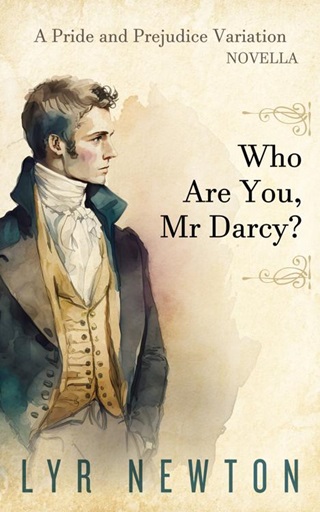Chapter 2
The encounter with Mr Darcy left Elizabeth in a state of nervousness she could not explain. She had been angry with him for so long and held resentment against him for so many reasons that her negative feelings had defeated her wisdom.
Even worse, her outburst had seemed to affect him and make him feel bad, and it certainly had not made her feel good. Before the conversation, she had been upset with him; afterwards, she was upset with herself.
Perhaps she would not have felt so uncomfortable if she had not seen him in such a candid and gentle situation with the children. Now, she felt guilty and that she had been unfair to him, though she knew too well it was not true. Strangely, she kept thinking of those leaves in his hair and wondered why she had not pointed them out to him.
She arrived at the Parsonage and tried to sneak into her room, but the entire family was there.
“My dear cousin, where have you been?” Mr Collins asked. “Colonel Fitzwilliam called, and he asked about you. It is not polite to disappoint him.”
“Mr Collins, the colonel did not express to me his intention of calling, and he certainly called on the family, not me personally. If he was disappointed, I hope it will not last long.”
Her harsh voice turned all eyes to her, and Mr Collins seemed to forget to breathe.
“My dear Eliza, are you unwell?” Charlotte asked. “Please have a cup of tea. I am sure it will be good for you.”
Elizabeth sat reluctantly and accepted the tea, planning to stay only as long as politeness required and to retire to her room quickly.
As she drank, she became more relaxed and continued the conversation in a more appropriate tone.
“I walked to the other side of the park and met two children, Peter and Betsy. I understand their mother, Mrs Gilroy, is a widow.”
“Ah yes, Mrs Gilroy’s situation is quite tragic,” Mr Collins said. “Her husband died last year. He was a hardworking man but not very wise. He was more fond of the brandy than the church. Lady Catherine was kind enough to give them that cottage and a little piece of garden on that side of the park, so they can grow vegetables and keep a goat and some chickens.”
“How kind of Lady Catherine.”
“Yes, exceedingly so. She is always most kind.”
“May I ask how he died?”
“He fell ill and never recovered. I am not sure… I usually avoid sick people. I do not want to catch something.”
Elizabeth looked at him and then at Charlotte and was ready to ask about a clergyman’s duty but restrained the impulse.
“The colonel said he would call again tomorrow.”
“I hope I shall be home. I shall take another walk tomorrow, at this time. I have suffered from some terrible headaches lately, and I find walking helps me.”
As much as she enjoyed the colonel’s company, Elizabeth had more important things to preoccupy her. She was well aware that the colonel had no serious designs on her — he simply prefer the company of those at the Parsonage to those at Rosings. Even if he had, her own feelings towards him were nothing more than those of a pleasant acquaintance she had known for a little while.
During the evening and through the night, Elizabeth pondered whether she should try to meet Mr Darcy again or not. He had offered her the opportunity to ask questions — something she might not have again in the future. She was curious in regard to Mr Wickham, of course, but most of all she was curious about Mr Bingley and his plans for the future.
Mr Darcy had claimed that he did not consider her an enemy, but surely they were not friends either, so it was unlikely he would answer such a delicate question. However, if she did not try, she would regret losing such an opportunity.
All sorts of small and silly things crossed her mind, such as the realisation that she did not know the name of Mr Darcy’s dog. She had never heard him say it, either when they were at Netherfield or during their encounter in the park. Of course, it was a meaningless detail, just like the leaves in his hair, and she was annoyed such things bothered her.
The next morning, after breakfast, she announced her intention to walk and refused Charlotte’s invitation to join her in calling on parishioners in Hunsford.
Elizabeth took a book for company in case there was no other, and she walked towards the meeting place. She had slept poorly, and the morning found her as nervous as the previous evening. As she walked, she saw a small cart laden with food, and she wondered whether it might be for Mrs Gilroy.
The children’s voices announced to her that she had reached her destination before she realised it.
The Great Dane recognised her first and ran to her. “Angus, down,” Mr Darcy ordered, and the dog stopped.
“Angus,” she repeated.
Peter and Betsy came to her, and Mr Darcy bowed. He seemed genuinely pleased to see her.
“Good day, Miss Bennet. I am glad to see you.”
“Miss Bennet, you have come again? Do you like us too?” Betsy asked.
“Of course I do!” She smiled.
“Mama and Tom are working in the field. Mama said we should stay at home, but she said we could come here if we want. We have played here every day since we moved.”
“The old house was bigger, but Mama said it took more wood to warm it and that wood is expensive,” Peter explained.
Although the children were joyful, Elizabeth’s heart ached.
“Miss Bennet, would you like to sit?” Mr Darcy asked, indicating the blanket. She hesitated, but the children insisted.
The grove was small enough, the blanket even more so, and sitting so close to Mr Darcy made her uncomfortable.
“What are the names of your puppies?” she asked. “They must be over two months old because they are already playing cheerfully.”
“Just puppy black and puppy white because one is black and one is white,” the girl explained with perfect seriousness.
“I see…yes, it makes perfect sense.”
“Mr Darcy said we must find other names, but we don’t know any,” Peter added.
“I am sure you will find some good names eventually,” Elizabeth replied with another glance at Mr Darcy.
“We found them last week just over there. Somebody threw them away,” Peter said. “Mama said you can’t throw away God’s creatures like they have no soul.”
“Your mother is perfectly right,” Elizabeth answered with much emotion.
“We were playing here, and then it began to rain, and we heard them crying, and then Mr Darcy came, and Angus barked at us, and we thought he would kill them, but he only liked them, and we took them, and Mr Darcy put them in his hat, and we took them home and warmed them and gave them warm milk, and they are all well now!” Betsy said all in one long breath as if she was afraid somebody would interrupt her. She looked at Elizabeth with large blue eyes to see whether she was impressed.
“What a wonderful story! You are such brave and kind children. Your mother must be very proud of you.”
“My mother said we must be brave and behave. I take care of Betsie, I am older,” Peter said with much formality, breaking Elizabeth’s heart even more.
A little while later, Mr Darcy indicated to the children they should return home as the sky had become clouded. He watched them leave and stood there until he saw them enter the house; only then did he turn to Elizabeth.
“Miss Bennet, we should walk back to the Parsonage. It looks like it might rain soon. But please do not hesitate to ask me any questions you want.”
“I…yesterday, there was another question I would have liked to ask. Now, I confess I am quite touched seeing you with the children. May I ask why?”
“It is a delicate story and…” He paused for a moment, then looked ahead as he spoke.
“I cannot provide you with all the details as it is a private matter which involves someone else. I can only say I have been well acquainted with the children’s father, Horace Gilroy, since I was a child and I visited Rosings with my parents. He was almost ten years my senior.”
“Oh…so you were friends?”
“Not exactly…Gilroy was Sir Lewis de Bourgh’s tenant — a hardworking and loyal man. Sir Lewis gave him the best piece of land, which he made very productive. They had a good house and a comfortable life. When Sir Lewis passed away seven years ago, he even left him the sum of five hundred pounds in his will.”
“How generous and kind of Sir Lewis.”
“Indeed. Unfortunately, Lady Catherine had quite a different opinion of Gilroy, and she was always displeased with him and his work.”
He paused, so Elizabeth said, “Which I assume displeased Lady Catherine exceedingly.”
“Indeed.”
Elizabeth breathed deeply and said, “It is quite unfortunate when someone’s dying wishes upset those that remain. I hope Lady Catherine granted Mr Gilroy the due amount after all.”
“She did.”
“Then it is a better situation than others — those where the sums owed were not given as requested.”
At that, he paused, looking at her, and she did the same. She could feel his repressed anger but still held his gaze boldly. Somebody had to confront him, after all. His good actions were no compensation for his dishonourable ones.”
“You are referring to Wickham, I assume,” he said directly.
“I am. I am well aware that I have no right to question your actions, Mr Darcy, but please remember that you offered to answer. You may choose to disregard the matter if you prefer.”
“I would prefer to disregard everything related to Wickham, but sadly, it seems fate keeps placing him in my path. I am sure he complained about the living that should have been his and my refusal to grant it.”
“He did, as well as the one thousand pounds that was also left to him. I know he was your father’s godson and that Mr Darcy had a great affection for him to the end.”
“Sadly, that part is true, and I am grateful that my father did not live to see his betrayal.”
The statement was powerful, and Elizabeth gulped the sudden lump in her throat. Surely Mr Darcy was only bringing false accusations to excuse his own faults.
“May I ask the nature of your interest in Wickham? I am well aware I have no right to question your relationship, but if I do, it is solely for your benefit.”
“There is no need to worry about my benefit, Mr Darcy. Mr Wickham is a dear friend of mine and of my family, and he granted me his trust in confessing such a delicate subject. Whoever knows his misfortunes would feel sorry for him. What could he have done to draw your resentment so much that you condemn him to poverty?”
Mr Darcy let out a bark of laughter that that gave her thrills and made her uncomfortable. His anger was apparent, and she was alone with him at quite a distance from any house.
“His misfortunes were great indeed, pour soul. As for the reasons which caused my resentment, I could never relate them to an honourable young lady.”
She looked at him with a frown.
“Miss Bennet, I do not wish to pain or offend you, but Wickham related his pathetic story to you not because he trusted you but because it is what he tells everyone when we are both in the same place. Everyone who does not know him, of course. Usually, people come to learn his true nature rather quickly and in ways that cause them pain and loss.”
His words affected Elizabeth more deeply than she expected; no, not so much his words as his voice and the dark expression on his face.
“I told you once before that he makes friends easily but cannot keep them long. I assume you did not believe me and still do not. When you next meet him, ask him about his claim that he had no interest in the church and wished to study the law. Ask him about the three thousand pounds that he received to support his studies, in addition to the one thousand pounds that was bequeathed and given to him. Ask him how many times I have paid his gambling debts and other creditors — all in the name of my father’s love for him, which he so horribly abused.”
Elizabeth stopped breathing. She stared at Mr Darcy, and every word cut her like a knife.
His gaze was dark and his expression deeply hurt, and he seemed willing to say more, but he did not.
“Sir, I—”
“For proof of my dealings with Wickham, you may apply to my cousin Colonel Fitzwilliam for confirmation. He is well aware of all the details.”
She found nothing to say, and even if she had wished to, she could not speak. Her mouth was dry, her heart was pounding, and her hands were shaking.
“We should make haste, Miss Bennet, it is raining already,” he said abruptly. “The Parsonage is only around the corner. If you do not need my further assistance, I shall leave you.”
With that, he mounted and departed in haste, with Angus following him.
Elizabeth remained still, gazing after him, with the rain pouring around her.
A while later, all wet, she entered the Parsonage, her head spinning with many more questions than she had before and with the pain in her chest she could not escape.
She went to change, and in the solitude of her room, she recollected all her conversations with Mr Wickham. He had related his story to her within two days of their first meeting, and that struck Elizabeth with its impropriety. Why would he trust someone he had only just met and did not know well enough to confide in? Also, as soon as Mr Darcy left Hertfordshire, Mr Wickham had spread his story around the neighbourhood. Not even that had bothered her at the time as she had been too occupied with hating Mr Darcy and accusing him of Jane’s suffering. Everyone appeared now in a new light. Mr Wickham had not revealed his story to her because he considered her trustworthy but because he thought she was silly enough to believe it! A silly simpleton she had been, fooled by a charming smile and pleasant manners.
She did not even doubt Mr Darcy’s words. His revelation was too full of anger and feelings to be a fabricated story or a deception. Unlike Mr Wickham’s narration, which had been calm and steady — and she had believed it immediately. A silly, stupid simpleton she had been — and she made a fool of herself in front of Mr Darcy too! Now he had good reason to despise her, indeed.
He had suggested she could apply to the colonel, which she did not need to do. But she desperately needed to speak to him again, apologise for her stupid accusation, and perhaps — if he would forgive her, which was very unlikely — finally ask him about Mr Bingley.
 Fullepub
Fullepub 



